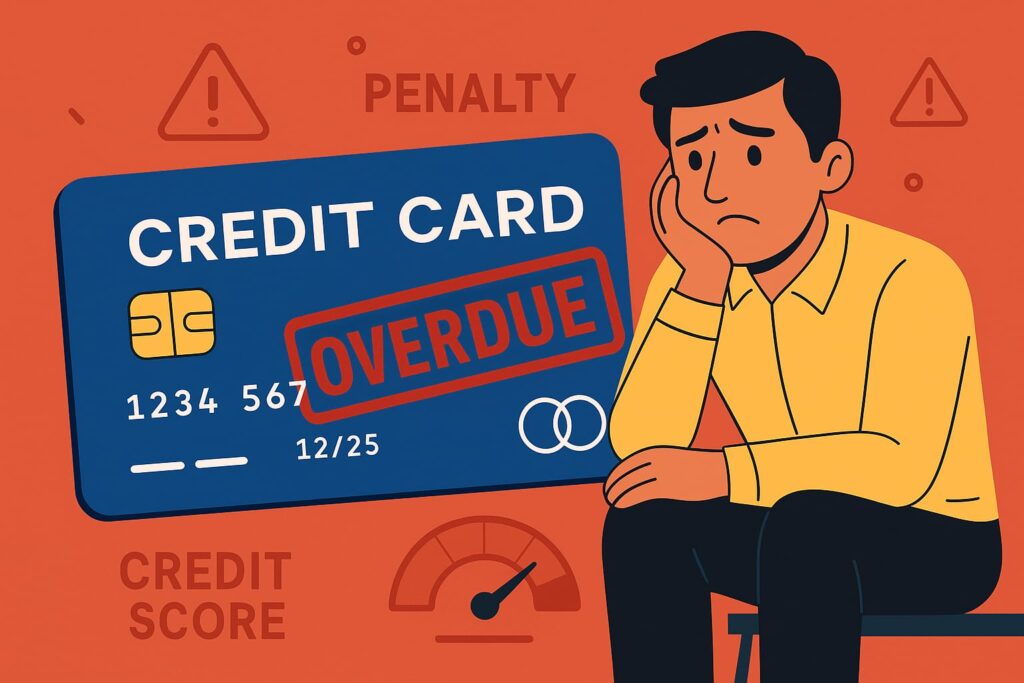💳 What Happens If You Stop Paying Your Credit Card Bills?
Credit cards are convenient, rewarding, and easy to use — until you miss a payment. Whether it’s due to forgetfulness, financial stress, or overuse, skipping even one payment can snowball into heavy penalties, interest, and credit score damage.
In this post, we break down exactly what happens when you stop paying your credit card bills in India (2025), what the consequences are, and what you should do immediately to avoid a financial disaster.
⚠️ Phase 1: What Happens Immediately After Missing a Payment?
Even a single missed due date can trigger several actions:
1. 💰 Late Payment Fee
Most banks charge a late fee of ₹500 to ₹1,200, depending on your outstanding balance.
This is applied on top of your original bill amount.
2. 📈 High Interest Charges
Interest rates on unpaid credit card balances range from 30% to 45% per annum.
Interest is compounded daily, so the longer you delay, the more you owe.
> Example: A ₹10,000 unpaid bill can balloon to over ₹14,000 in 6 months!
3. 📉 Credit Score Hit (CIBIL)
Credit bureaus like CIBIL, Experian, or CRIF get notified.
A single missed payment can reduce your score by 50–100 points.
⏳ Phase 2: 30–90 Days After Non-Payment
If you still don’t pay after the first month, things get worse:
1. ☎️ Reminder Calls & Emails
You’ll start receiving frequent calls, emails, and SMS reminders from your bank’s collection team.
2. 💣 Negative Credit Report
Your report now shows “30+ DPD” (Days Past Due), making it hard to get loans or EMIs in future.
3. 🏦 Credit Card Gets Frozen
Your card will be blocked for future use, and auto-debits will stop working.
🧨 Phase 3: 90–180 Days After Non-Payment
Now your account is legally classified as a default.
1. 🚨 Legal Notices
You may receive a legal notice from the bank.
Under SARFAESI Act, if your debt crosses a certain amount, banks can initiate legal action.
2. 🧾 Settlement Offers
The bank may offer you a one-time settlement, where you pay part of the amount.
But beware: even a “settled” account is reported as negative on your credit score.
3. 🧑💼 Third-Party Recovery Agents
Banks may pass your account to collection agencies.
They might visit your home or office for recovery.
💀 Final Phase: 180+ Days – What If You Never Pay?
If your credit card bill remains unpaid for 6+ months:
1. 🔻 Credit Score Falls Below 600
This means:
No personal loan approval
Car/home loan rejection
Difficulty in getting even prepaid SIM cards in some cases
2. 📉 “Written Off” Status
Bank will write off your account as non-performing asset (NPA).
This is reported in credit bureaus as a serious default.
3. ⚖️ Lawsuit Possibility
In rare high-value cases, banks may file a civil case for recovery.
⚠️ Note: Credit card debt is unsecured, but can still lead to legal and social harassment.
🛑 What NOT to Do
❌ Don’t ignore bank calls — it worsens your case
❌ Don’t apply for more credit to pay old debt
❌ Don’t accept random “settlement” offers without written confirmation
✅ What You Should Do Immediately
1. 📞 Call the Bank
Request a payment extension, EMI conversion, or interest waiver.
2. 🧾 Convert to EMI
Many banks allow converting your outstanding amount into 6–24 month EMIs at lower interest.
3. 💬 Request a Moratorium
If you’re facing genuine hardship (job loss, illness), request a moratorium or deferral plan.
4. 💳 Pay Minimum Due (If You Can’t Pay Full)
Paying at least the minimum due keeps your account from going delinquent — though interest will still apply.
🧠 How to Prevent This in Future
🔔 Set payment reminders
🔁 Enable auto-pay for full payment
🎯 Keep utilization under 30% of your limit
💼 Don’t have more than 2–3 credit cards if you’re new to credit
📊 Quick Summary Table
Days Past Due Consequences
1–30 Days Late fee, interest, credit score dip
31–90 Days Frozen card, recovery calls, score damage
91–180 Days Legal notice, settlement offers, default label
180+ Days Account write-off, score <600, legal case risk
🧾 Real Example
Ravi, a 27-year-old in Pune, missed paying his ₹22,000 bill due to a job loss.
Within 4 months, he owed ₹29,400 with late fees + interest. His CIBIL score dropped from 780 to 641. After converting to EMI, he regained control and his score improved gradually.
🧠 Final Thoughts
A credit card is a powerful tool — but if misused, it becomes a financial trap. If you’re unable to pay your bill, act early. Communicate with your bank, explore EMI options, and protect your credit history at all costs.
Your credit score is like your financial reputation — once damaged, it takes years to rebuild.
⚠️ Disclaimer
This article is for educational purposes only. Please contact your bank or a licensed financial advisor before taking any action related to credit card debt.

